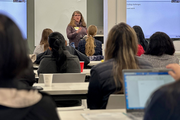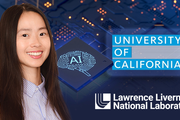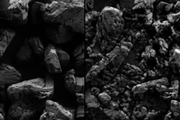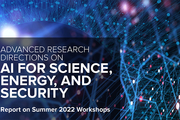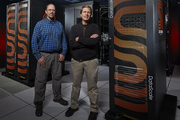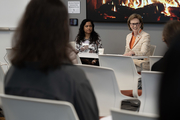Did you know we have a monthly newsletter? View past volumes and subscribe.
Igniting scientific discovery with AI and supercomputing (VIDEO)
April 15, 2024 -
LLNL’s fusion ignition breakthrough, more than 60 years in the making, was enabled by a combination of traditional fusion target design methods, high-performance computing (HPC), and AI techniques. The success of ignition marks a significant milestone in fusion energy research, and was facilitated in part by the precision simulations and rapid experimental data analysis only possible through...
Welcome new DSI team members
April 2, 2024 -
When Data Science Institute (DSI) director Brian Giera and deputy director Cindy Gonzales began planning activities for fiscal year 2024 and beyond, they immediately realized that LLNL’s growth in data science and artificial intelligence (AI)/machine learning (ML) research requires corresponding growth in the DSI’s efforts. “Our field is booming,” Giera states. “The Lab has a stake in the...
WiDS Livermore conference attendees network, share research and absorb wisdom
March 27, 2024 -
Co-sponsored by the DSI, LLNL on March 13 hosted the 7th annual Women in Data Science (WiDS) conference for data scientists, industry professionals, recent graduates and others interested in the field. As an independent satellite of the global WiDS conference celebrating International Women’s Day, the Livermore hybrid event was held to highlight the work and careers of LLNL and regional data...
Predicting climate change impacts on infrastructure (VIDEO)
Feb. 26, 2024 -
At LLNL, electrical grid experts and climate scientists work together to bridge the gap between infrastructure and climate modeling. By taking weather variables such as wildfire, flooding, wind, and sunlight that directly impact the electrical grid into consideration, researchers can improve electrical grid model projections for a more stable future. In a new video, LLNL computer scientist...
Register for WiDS Livermore on March 13
Feb. 8, 2024 -
The annual Women in Data Science (WiDS) conference returns on Wednesday, March 13. This is the seventh year for WiDS Livermore, which is independently organized by LLNL to be part of the mission to increase participation of women in data science and to feature outstanding women doing outstanding work. The all-day WiDS Livermore event is free and will be presented in a hybrid format. Everyone...
Data Days brings DOE labs together for discussions on data management and more
Nov. 9, 2023 -
Data researchers, developers, data managers, and program managers from the DOE national laboratories visited LLNL on October 24–26 to discuss the latest in data management, sharing, and accessibility at the 2023 DOE Data Days (D3) workshop. Sponsored by the National Nuclear Security Administration’s (NNSA) Office of Defense Nuclear Nonproliferation and hosted annually by LLNL, the event...
LLNL’s Kailkhura elevated to IEEE senior member
Nov. 8, 2023 -
IEEE, the world’s largest technical professional organization, has elevated LLNL research staff member Bhavya Kailkhura to the grade of senior member within the organization. IEEE has more than 427,000 members in more than 190 countries, including engineers, scientists and allied professionals in the electrical and computer sciences, engineering and related disciplines. Just 10% of IEEE’s...
LLNL, University of California partner for AI-driven additive manufacturing research
Sept. 27, 2023 -
Grace Gu, a faculty member in mechanical engineering at UC Berkeley, has been selected as the inaugural recipient of the LLNL Early Career UC Faculty Initiative. The initiative is a joint endeavor between LLNL’s Strategic Deterrence Principal Directorate and UC national laboratories at the University of California Office of the President, seeking to foster long-term academic partnerships and...
Explainable artificial intelligence can enhance scientific workflows
July 25, 2023 -
As ML and AI tools become more widespread, a team of researchers in LLNL’s Computing and Physical and Life Sciences directorates are trying to provide a reasonable starting place for scientists who want to apply ML/AI, but don’t have the appropriate background. The team’s work grew out of a Laboratory Directed Research and Development project on feedstock materials optimization, which led to...
High-performance computing, AI and cognitive simulation helped LLNL conquer fusion ignition
June 21, 2023 -
For hundreds of LLNL scientists on the design, experimental, and modeling and simulation teams behind inertial confinement fusion (ICF) experiments at the National Ignition Facility, the results of the now-famous Dec. 5, 2022, ignition shot didn’t come as a complete surprise. The “crystal ball” that gave them increased pre-shot confidence in a breakthrough involved a combination of detailed...
Visionary report unveils ambitious roadmap to harness the power of AI in scientific discovery
June 12, 2023 -
A new report, the product of a series of workshops held in 2022 under the guidance of the U.S. Department of Energy’s Office of Science and the National Nuclear Security Administration, lays out a comprehensive vision for the Office of Science and NNSA to expand their work in scientific use of AI by building on existing strengths in world-leading high performance computing systems and data...
Data science meets fusion (VIDEO)
May 30, 2023 -
LLNL’s historic fusion ignition achievement on December 5, 2022, was the first experiment to ever achieve net energy gain from nuclear fusion. However, the experiment’s result was not actually that surprising. A team leveraging data science techniques developed and used a landmark system for teaching artificial intelligence (AI) to incorporate and better account for different variables and...
LLNL and SambaNova Systems announce additional AI hardware to support Lab’s cognitive simulation efforts
May 23, 2023 -
LLNL and SambaNova Systems have announced the addition of a spatial data flow accelerator into the Livermore Computing Center, part of an effort to upgrade the Lab’s CogSim program. LLNL will integrate the new hardware to further investigate CogSim approaches combining AI with high-performance computing—and how deep neural network hardware architectures can accelerate traditional physics...
Celebrating the DSI’s first five years
May 18, 2023 -
View the LLNL Flickr album Data Science Institute Turns Five.
Data science—a field combining technical disciplines such as computer science, statistics, mathematics, software development, domain science, and more—has become a crucial part of how LLNL carries out its mission. Since the DSI’s founding in 2018, the Lab has seen tremendous growth in its data science community and has invested...
Patent applies machine learning to industrial control systems
May 8, 2023 -
An industrial control system (ICS) is an automated network of devices that make up a complex industrial process. For example, a large-scale electrical grid may contain thousands of instruments, sensors, and controls that transfer and distribute power, along with computing systems that capture data transmitted across these devices. Monitoring the ICS network for new device connections, device...
Computing codes, simulations helped make ignition possible
April 6, 2023 -
Harkening back to the genesis of LLNL’s inertial confinement fusion (ICF) program, codes have played an essential role in simulating the complex physical processes that take place in an ICF target and the facets of each experiment that must be nearly perfect. Many of these processes are too complicated, expensive, or even impossible to predict through experiments alone. With only a few...
First-ever hybrid Women in Data Science Livermore event celebrates achievements, supports women in the field
March 14, 2023 -
Celebrating International Women’s Day on March 8, LLNL women data scientists, Lab employees and other attendees interested in the field gathered at the Livermore Valley Open Campus for the annual Livermore Women in Data Science (WiDS) regional event held in conjunction with the global WiDS conference. Attendees met online and in-person for the forum, highlighting women in computing and the...
Register for WiDS Livermore on March 8
Jan. 31, 2023 -
The annual Women in Data Science (WiDS) conference returns on Wednesday, March 8. LLNL will again host a regional event in conjunction with the worldwide conference. The all-day WiDS Livermore event is free and will be presented in a hybrid format. Everyone is welcome to attend. Along with plenty of food and networking opportunities, WiDS Livermore will include a livestream of the Stanford...
Skywing: Open-source software aids collaborative autonomy applications
Jan. 25, 2023 -
A new software developed at LLNL, and known as Skywing, provides domain scientists working to protect the nation’s critical infrastructure with a high-reliability, real-time software platform for collaborative autonomy applications. The U.S. modern critical infrastructure—from the electrical grid that sends power to homes to the pipelines that deliver water and natural gas and the railways...
New HPC4EI project to create 'digital twin' models for aerospace manufacturing
Jan. 19, 2023 -
A partnership involving LLNL aimed at developing “digital twins” for producing aerospace components is one of six new projects funded under the HPC for Energy Innovation (HPC4EI) initiative, the Department of Energy’s Office of Energy Efficiency and Renewable Energy announced. Sponsored by the HPC4Manufacturing (HPC4Mfg) Program, one of the pillars of HPC4EI, the collaboration between LLNL...



